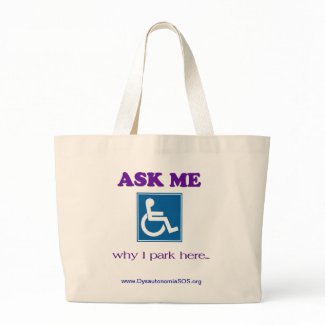I see much posting going on regarding INVISIBLE ILLNESS and spreading awareness by promoting the idea of an illness being invisible. This term has always bothered me, as I have mentioned before on this blog. It has the ring of victim/helplessness to me, and I tend to like things that are assertive, proponents for change, and action oriented.
I think the problem here is two fold:
1. There is no invisible illness, JUST IGNORANCE. What illness is truly visible? There are very few compared to vast majority of illnesses, diseases, and conditions that people suffer in silence and try to hide - or that do not cause them to look deformed or like the traditional notion of "ill." And that traditional notion of illness is what needs to change. By continuing to use the term invisible illness, we are separating ourselves from other people that "look sick," and in my opinion, making the problem worse.
2. People find their identity in the "invisible illness" movement, and use it as something to hide behind. NOT EVERYONE. I know that is probably not most people's conscious intention. Many are looking to find a way to spread awareness, which I commend. But is this how any of us want to be known? As invisible? Is this the best way to spread awareness?
What society sees are deformities and stereotypes. Not illness. They see something out of the ordinary and recognize something is "not right" with that person. This actually has nothing to do with if they are "ill" in some cases. Is an amputee ill? Maybe. Or maybe they are missing a leg, but otherwise are perfectly healthy, and do triathlons. This is a problem with society, not with those of us who are chronically ill, and we need to address those stereotypes if anything is going to change. We need to speak about our conditions by NAMING THEM, and being visible, not promoting an image that quite frankly can be a bit whiny sounding at times.
When I go to the doctor - which by the way is the only time I get to leave the house because my health is not the greatest right now - I am on a stretcher. I am strapped into a freaking stretcher, accompanied by paramedics. That's how I roll. And I STILL get questioning looks, people staring. I can see it in their expressions - what is wrong with her? The medical professionals all exclaim that I look great, I am waaaaay to perky to be sick, and they ask what is wrong. THEN I SCHOOL THEM. Literally. And in a good way.
I love it when people ask me what is wrong, or tell me I look great. I do look great dammit - considering what I have been through, so that is not an insult at all. And it gives me a chance to explain and educate them in simple terms that I am indeed very sick, my nervous system is broken, and I pass out when I am upright very quickly. It causes me to feel like I have run a marathon by the simple act of rolling over, or just sitting up. No more detail is needed, unless I am looking for some sympathy. On some days I need some sympathy - no shame in that - and will launch into more detail about how I constantly feel like I have the flu, my heart pounds, I have to lay flat for hours, showering puts me down for days, etc.... They then say, "Oh! That sounds terrible, I never would have known!" And I smile and hope that they have learned something about Dysautonomia and maybe will now Google it, because the young (younger-ish -sorta kind of young, humor me here) chick on the stretcher was in the office today, and she has Dysautonomia.
My point is - I AM ON A FREAKING STRETCHER! And I still don't look "sick enough" for most people to recognize that something is wrong. And they are curious, mostly kind, and just want to know. And they want to know why I still smile and joke, and am generally a silly goofy person. I ask them point blank - what is the alternative? Should I be depressed? This is where I am at, I have my sad days, but I am grateful for what I have most of the time and am trying to make the most of it.
So - what is so wrong with someone asking why? I actually do the same thing. I see a younger, or older, pretty or handsome person and assume they are healthy. If they have rosy cheeks, look fairly "well" and are standing upright, why would I think they are ill? How else would I know? How else would you know? Because that is what society has taught us. That beauty, symmetry, no deformities, and young-ish-ness equal health. Only really really old people, people that look like they are obviously dying (including children), and people with obvious physical deformities are "sick looking" from the outside.
So how to we address those stereotypes? How do we, the chronically ill, that suffer in silence many times, become visible?
We educate, share, and make people aware of what is wrong with our health. We talk openly about what our illness looks like. And we do it in a way that non-sick people can understand.
We NAME OUR ILLNESS. We choose to VISIBLE.
We come up with ways to notify people that something is wrong with us, if we want them to know (not everyone is comfortable with the world knowing what is wrong with them, and that is perfectly fine! Just don't complain that no one knows you are sick or understands if you are trying to hide it - people are not in general psychic!). This is why I like the spoon theory - it is an easy to understand, relate-able way to explain the lack of energy with chronic illness to those who don't have a chronic illness. There are tools like that out there for just about every chronic illness situation.
Stereotypes
For instance, lets check out some random pictures I pulled off the web. I have no idea what is wrong with these people, they came from Google images, after I typed in "sick people":
This poor woman looks very sick. Actually she looks likes she is dying, which she may be. Based on her lack of hair, we assume she has cancer, or maybe brain surgery, but don't know. But we know she is sick. I hope she is ok, which is a lame thing to write, but I really do. I have heard people compare POTS to cancer, or say they wish they had cancer because then they would have treatment options, and I DO NOT. I am thankful every day that I will live, and that I don't have cancer. Do you really want this? Do you want your illness to be killing you to the point that it is this obvious? Some of us have life threatening progressive diseases, and someday may unfortunately end up like this, but should enjoy every minute we are not and be thankful for it.
This pretty lady is missing an arm. She may have other stuff wrong with her, I don't know. But if you saw her, you know that she has "earned" her handicap parking spot, and something obviously happened to her. But is she sick? On a daily basis? In pain? We have no clue.
This man is hooked up to a dialysis machine. That means his kidney's are failing, and he may be dying. This picture struck me, because if I saw him rockin his mullet out and about at the grocery store, I'd have no clue that he spent part of his days fighting for his life. Did he get a transplant and is ok now? I hope so.
We hopefully all know who this is. In case you did not know, this is Stephen Hawking, the famous physicist, who continues to work through a motor neurone disease related to amyotrophic lateral sclerosis, a condition that has progressed over the years. He is now almost completely paralyzed and communicates through a speech generating device. He is obviously very ill.
I think this girl may have Masto or Lupus, but I'm not sure. She has something obviously wrong with her face. Do you envy her? I ask this, because so many complain about people "pestering" them about not looking sick. This looks painful to me, and I do not envy her. I am grateful that I have to answer questions, and not deal with this skin condition. Especially if it is severe Masto or Lupus, neither are fun.
Last one. This guy is actually pretty good looking. He's in a wheel chair. There are lots of really good looking people in a wheel chair, or missing limbs, or with minor deformities. Are they "visibly" sick? Do they deserve a handicap parking spot more than us "invisibly sick" folks? Nope.
We really are very superficial in this country, and in others as well I'm sure. We are judging people based on their outsides, and being judged as well. But is it really insulting and so terrible to "not loook sick" ???? Nope. Most people don't mean any harm by it, they just don't know. And my point is - none of us do.
Again, I commend people trying to advocate for awareness. But I feel its time to start taking some responsibility and educating the public and our loved ones. I know many people deal with insensitive family and friends who don't understand. Well, show them the spoon theory. Play the wonderful video by DINET called Changes about POTS. Explain to them in terms they will understand, like having the flu, running up stairs, and other situations that people can relate to. Because we all know that until you have really experienced it, you have no idea what it really FEELS like. I have no clue what it's like to have cancer, or not be able to feel my legs, I don't pretend to. If doing those things does not improve how someone views you and treats you, then chances are they wouldn't be very supportive if you were visibly sick either.
And if you are tired of people staring when you park in the handicap spot, take the time to explain to them whats wrong. Start telling people. Volunteer to work with a charity and promote awareness for your condition. Do something proactive.
SPEAK UP AND BECOME VISIBLE.
We joked about creating a sign that we could wear to explain what is wrong. Well - I have a few solutions. This blog post inspired these, and some will be in the Dysautonomia SOS awareness shop. They are silly (of course), but may spark conversation and allow for you to explain a little easier why you are laying on the floor of a store taking a break from shopping.
1. The giant tote you can carry while getting out of your vehicle:

Ask Me Why I Park Here Bag by DysautonomiaSOS
2. Embrace your Dysautonomia Diva (I make sick look good):

Dysautonomia Diva Shirt by DysautonomiaSOS
3. Advertose that you or your loved one is gravitationally challenged:
IN CONCLUSION:
I hope by this to only start a conversation. I am not criticizing anyone, and again - I respect the efforts made by the chronically ill "invisible" community to get the word out in what ever way they can. But I hope that we can all start to speak up, stand up (if you are able), and be visible - and teach people (especially the medical world) about Dysautonomia and other conditions that may not be physically apparent, and start using more assertive terms and labels to promote and affect change.
My hope is the focus will be on "chronic illness" instead of "invisible illness" - so we can name the real problem. It's not that you can't see what's wrong, but that what is wrong is chronic, painful, relentless, hard to understand, and life changing.
Love to you all,
Claire









Love this post! You are right we need to make our illlness more visible. When will the t-shirts be out? I am definitely buying the Dysautonomia Diva shirt :-)
ReplyDeleteThanks Tasha! The shop will be up on Zazzle.com in a few days - I'll definitely post it on Team Fight POTS :) I've been having fun creating stuff, very excited!
DeleteFantastic post, Claire!
ReplyDeleteI was really challenged when I recently looked up some statistics on chronic illness. Some 1 in 2 people have a chronic illness. I was floored, honestly. I had to take a good, hard look at my own expectations of the people around me. A very small percentage had shared their own health struggles with me. Interestingly, in retrospect, they were the very ones who reached out to me during a particularly bad time several years back.
What I have found this past year, though, is that the more I open up about my own health issues - the pain, fatigue, and the daily nature of it - the more others start to open up about theirs. Friends with chronic illnesses have started to come out of the woodwork! When we decide to make our own illnesses visible, it almost gives some people the permission they need to share about theirs. So many of us choose to remain invisible, I think, because of all of the people who haven't understood - yet we've been surrounded by people who so understand, they're just in hiding.
I totally understand some people choosing to not be public about their health struggles for whatever reason. But so many people are struggling with chronic illnesses and I really think many of them just need permission to talk about it and to bring their own condition out in the open.
The term "invisible illness" never bothered me much, since I understood the purpose was to bring those illnesses, and the struggles of those who have them, out into the open. But I really appreciate what you are saying about the importance of naming illnesses for the sake of education and awareness!
Thanks Kari !!!!!
ReplyDeleteI think half the issue is leaving behind the shame of illness. As a society we tend to make people feel guilty for being ill, that it is some sort of personal failing as opposed to something that can just happen. It's even worse when you have something that doesn't conform to the typical ideas of illness, ie the acute illness, where it's get sick, have treatment, get well. Chronic illness just doesn't fall into the easy to understand paradigm of illness. Not getting better seems to be interpreted by many as not trying, so people simply don't discuss illness. Until we can move past that and discuss illness openly I think we'll be stuck with the invisible illness paradigm. It's part of the reason I'm so open about my own issues, in particular the less savoury aspects of illness. It's the posts where I discuss things like my gastric issues that I get inundated with emails from people saying thank you, that they showed their husband, family, friends, or finally discussed it with their doctors. We need to take these issues out of the shadows, they aren't embarrassing or shameful, they are simply a fact of illness and many people are dealing with the same or similar issues. Discussing that openly takes away the invisible aspect and in the long run helps the wider community understand what we are going through. We hide way too much about being ill and that creates an even bigger burden for all of us. I still deal with people who don't get it, or tell me not to be so open, but that doesn't phase me much any more, and I'm not embarrassed any more. Even my kids and David are open about it all and very upfront when asked how I am. If someone starts the usual malarky they are very clear in setting them straight. For the most part now people are aware of how ill I am even when I am looking pretty good and it's been ages since a doctor or other medical staff has questioned my illness. Visibility is not just the aesthetic, if only we could get more people, ill and well, to understand that. (sorry for the ramble still really brady today so it may not make much sense ;))
ReplyDeleteWell said (as always!) and agreed on all counts. There are ways to share what we go through to make non-chronically ill people understand, without sounding negative or whining. Also- how can we expect anyone to know if we are trying to hide our illnesses? I have no problem with anyone being private or closeted about their illness, but don't complaint that no one understands if you don't help them understand. I see this in the support groups A LOT.
ReplyDeletexoxoxox